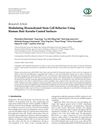Search
for
Sort by
Research
240-270 / 1000+ resultsresearch Genetically Modified Laboratory Mice with Sebaceous Glands Abnormalities
Genetic changes in mice help understand skin and hair disorders, aiding treatment development for acne and hair loss.

research New Developments in the Molecular Treatment of Ichthyosis: Review of the Literature
New treatments for ichthyosis, like protein replacement and gene therapy, show promise and may become standard care.

research Using Proteomics to Compare the Molecular Structures of Sulfide and Permeate-Depilated Sheepskins
The conclusion is that using bovine milk permeate to remove wool from sheepskins is eco-friendly and results in smoother, higher quality leather compared to traditional sulfide methods.
research Molecular Mechanisms Regulating Hair Follicle Development
Understanding hair follicle development can help treat hair loss, skin regeneration, and certain skin cancers.

research Spermidine Promotes Human Hair Growth and Is a Novel Modulator of Human Epithelial Stem Cell Functions
Spermidine may help reduce hair loss and deserves further testing as a treatment.

research Hair Keratin KRT81 Is Expressed in Normal and Breast Cancer Cells and Contributes to Their Invasiveness
The hair keratin gene KRT81 is found in both normal and breast cancer cells and helps them invade surrounding tissues.

research Alopecia Areata Susceptibility Variant Identified by MHC Risk Haplotype Sequencing Reproduces Symptomatic Patched Hair Loss in Mice
A gene variant causes patched hair loss in mice, similar to alopecia areata in humans.

research Bacteria Induce Skin Regeneration via IL-1β Signaling
Skin bacteria, specifically Staphylococcus aureus, help in wound healing and hair growth by using IL-1β signaling. Using antibiotics on skin wounds can slow down this natural healing process.

research Comparative Study on Seasonal Hair Follicle Cycling by Analysis of the Transcriptomes from Cashmere and Milk Goats
Cashmere and milk goats have different hair growth cycles and gene expressions, which could help improve wool production.

research Cutaneous Transcriptome Analysis in NIH Hairless Mice
Key genes linked to hair growth and cancer were identified in hairless mice.

research RSPO1-Mutated Keratinocytes From Palmoplantar Keratoderma Display Impaired Differentiation and Invasiveness: Implications for Squamous Cell Carcinoma Susceptibility in Patients With 46XX Disorder of Sexual Development
RSPO1 mutations in certain patients lead to skin cells that don't develop properly and are more likely to become invasive, increasing the risk of skin cancer.

research Molecular Modeling and Structural Characterization of a High Glycine–Tyrosine Hair Keratin Associated Protein
The 3D structure of a key hair protein was modeled, revealing specific helical structures and stabilization features.

research Development, Structure, and Keratin Expression in C57BL/6J Mouse Eccrine Glands
The study found that mouse sweat glands develop before birth, mature after birth, and have specific keratin patterns.

research Modulating Mesenchymal Stem Cell Behavior Using Human Hair Keratin-Coated Surfaces
Coating surfaces with human hair keratin improves the growth and consistency of important stem cells for medical use.

research Post-Transcriptional Regulation of Keratinocyte Progenitor Cell Expansion, Differentiation, and Hair Follicle Regression by miR-22
miR-22, a type of microRNA, controls hair growth and its overproduction can cause hair loss, while its absence can speed up hair growth.
research Keratin-6 Driven ODC Expression in Hair Follicle Keratinocytes Enhances Stemness and Tumorigenesis by Negatively Regulating Notch
ODC overexpression in hair cells increases tumor growth by reducing Notch signaling.
research Caffeine Docking Studies with Keratin: Implications for Its Cosmetic Applications
Caffeine may be good for hair growth and skin care because it binds well with keratin.
research Gene Expression Profile of Human Follicle Dermal Papilla Cells in Response to Camellia Japonica Phytoplacenta Extract
Camellia japonica extract may improve scalp health and promote hair growth.

research Keratinocytes of the Upper Epidermis and Isthmus of Hair Follicles Express Hemoglobin mRNA and Protein
Skin cells and certain hair follicle areas produce hemoglobin, which may help protect against oxidative stress like UV damage.

research Identification of Key Genes and Signaling Pathways Related to Hetian Sheep Wool Density by RNA-Seq Technology
Certain genes and pathways are linked to the production of finer and denser wool in Hetian sheep.

research The Biology and Genomics of Human Hair Follicles: A Focus on Androgenetic Alopecia
Hair loss in Androgenetic Alopecia is caused by genetics, aging, and lifestyle, leading to hair follicle shrinkage and related health risks.

research Hair Loss and the Applied Techniques for Identification of Novel Hair Growth Promoters for Hair Regrowth
Many products for hair re-growth exist, but a perfect treatment without side effects has not yet been found.

research Advances in Hair Diseases
The review highlights the importance of stem cells in hair health and suggests new treatment strategies for hair loss conditions.

research Molecular Principles of Hair Follicle Induction and Morphogenesis
Hair follicle development is controlled by interactions between skin tissues and specific molecular signals.

research Polymeric Nanoparticles-Based Topical Delivery Systems for the Treatment of Dermatological Diseases
Polymeric nanoparticles show promise for treating skin diseases.

research Hair Follicle Stem Cells: Walking the Maze
Hair follicle stem cells are key for hair and skin regeneration, can be reprogrammed, and have potential therapeutic uses, but also carry a risk of cancer.

research Human Hair Follicle Organ Culture: Theory, Application, and Perspectives
Human hair follicle organ culture is a useful model for hair research with potential for studying hair biology and testing treatments.

research Stretching the Limits: From Homeostasis to Stem Cell Plasticity in Wound Healing and Cancer
Stem cell plasticity is crucial for wound healing but can also contribute to cancer development.

research Alopecia Areata: A Comprehensive Review of Pathogenesis and Management
New treatments for Alopecia Areata show promise but need to be more effective and affordable.